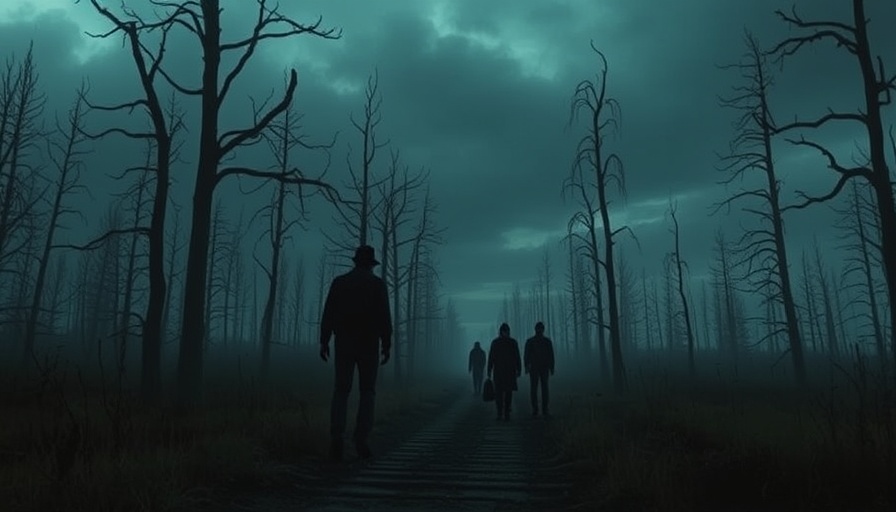
Exploring Palestine's Resilience Through Cinema
Rashid Masharawi’s film anthology, From Ground Zero, which features 22 short stories crafted by Palestinian filmmakers, offers a poignant exploration of life in Gaza amidst ongoing conflict. This collection, which recently represented Palestine at the Academy Awards, highlights not only the trials that face its people but celebrates the art of storytelling as a means of resilience and hope.
Art as a Vehicle for Memory and Imagination
In today’s film landscape, it's easy to become overwhelmed by images of violence and despair, particularly when it comes to regions like Gaza. Masharawi’s anthology intentionally steers clear of depicting graphic violence. Instead, it focuses on the profound human experiences of love, loss, and hope. He states, “Cinema can protect memory and can keep Palestinians on the ground because films are like dreams, ideas. Nobody can occupy dreams.” This philosophy sets the tone for a collection that seeks to uplift rather than solely document tragedy.
A Mixed Bag of Stories: Humor Amidst Pain
One of the unique features of From Ground Zero is the way it weaves dark humor into narratives that could easily slip into despair. Through stories like Hell’s Heaven, where the protagonist wakes up in a body bag, the film subverts tragedy with irony, showcasing the resilience of the human spirit. Masharawi believes that humor is a mechanism for coping, allowing viewers to experience a multi-faceted representation of despair that includes laughter.
The Stories Behind the Films
Each short film in the anthology sheds light on different aspects of Palestinian life. From Selfie by Reema Mahmoud—a heartfelt letter sent via an imagined bottle tossed into the sea—to Soft Skin, which tells of children learning stop-motion animation as a means of expressing their grief, each narrative carries its own unique tone. The anthology’s approach reflects a fundamental truth: despite the chaos, hope blooms in unexpected places. For viewers, these stories not only inform but invite emotional participation, offering a chance to connect with the Palestinian experience on a deeper level.
Viewing Gaza Through a Lens of Optimism
The anthology asserts a belief in the importance of storytelling as a tool for optimism. Masharawi encourages both creators and audiences to see beyond immediate struggles, suggesting that art can inspire a sense of agency and continuity. “We have to be optimistic,” he insists, expressing a vision where creation and imagination can flourish despite adversity. Cinema becomes a form of resistance, offering a way to remember and speak truth even when faced with oppression. As filmmakers tell their stories, they forge connections with the global community and challenge perceptions of Palestinian life.
Participation and Proactivity: Engagement Through Cinema
The call to action for audiences is clear: engage with these stories and allow them to shape one’s understanding of Palestine beyond the headlines. By watching films like those in From Ground Zero, individuals become part of a larger dialogue about resilience, creativity, and the need for representation. Understanding these narratives isn’t just about viewing art; it’s about participating in a collective memory that insists on being heard and acknowledged. As Masharawi emphasizes, “Tomorrow it’s a better day. Keep dancing, keep creating.”
Why This Matters: Relevance in Today’s World
For digital nomads and culturally curious individuals, the stories captured in From Ground Zero provide critical insights into a region frequently misrepresented in mainstream narratives. Fostering empathy through cultural engagement allows for deeper connections to the diverse experiences shaped by conflict. As global citizens, understanding the context of such stories is vital in realizing the importance of supporting artistic expression as a conduit for change.
In conclusion, From Ground Zero is not just a film anthology; it’s a cultural phenomenon that opens a window into Palestinian life. Through storytelling, viewers are reminded of the creative resilience that thrives even in the most challenging circumstances. Engage with these narratives, and witness the implications they have for not only understanding Palestine but the values of hope, solidarity, and shared humanity that resonate universally.
 Add Row
Add Row  Add
Add 




Write A Comment